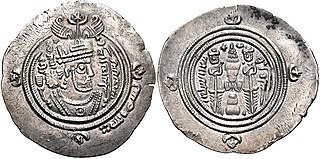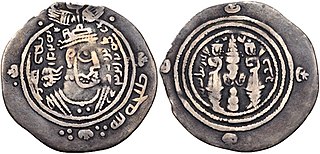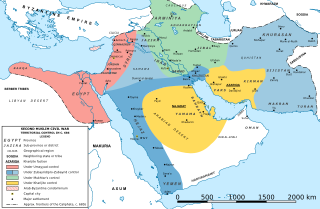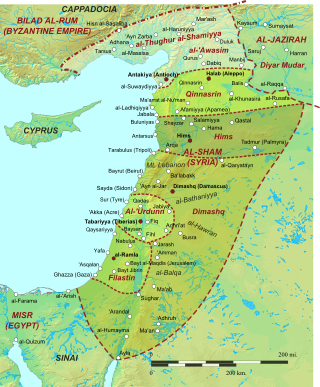
Yazid ibn Mu'awiya ibn Abi Sufyan, commonly known as Yazid I, was the second caliph of the Umayyad Caliphate, ruling from April 680 until his death in November 683. His appointment by his father Mu'awiya I was the first hereditary succession to the caliphate in Islamic history. His caliphate was marked by the death of Muhammad's grandson Husayn ibn Ali and the start of the crisis known as the Second Fitna.
Banu Abd Shams refers to a clan within the Meccan tribe of Quraysh.

Mu'awiya ibn Yazid ibn Mu'awiya, commonly known as Mu'awiya II, was the third Umayyad caliph, ruling for less than a year in 683–684.

Marwan ibn al-Hakam ibn Abi al-As ibn Umayya, commonly known as Marwan I, was the fourth Umayyad caliph, ruling for less than a year in 684–685. He founded the Marwanid ruling house of the Umayyad dynasty, which replaced the Sufyanid house after its collapse in the Second Fitna and remained in power until 750.

Abd Allah ibn al-Zubayr ibn al-Awwam was the leader of a caliphate based in Mecca that rivaled the Umayyads from 683 until his death.

The Second Fitna was a period of general political and military disorder and civil war in the Islamic community during the early Umayyad Caliphate. It followed the death of the first Umayyad caliph Mu'awiya I in 680, and lasted for about twelve years. The war involved the suppression of two challenges to the Umayyad dynasty, the first by Husayn ibn Ali, as well as his supporters including Sulayman ibn Surad and Mukhtar al-Thaqafi who rallied for his revenge in Iraq, and the second by Abd Allah ibn al-Zubayr.

Jund Ḥimṣ was one of the military districts of the caliphal province of Syria.
Abu Uthman Amr ibn Uthman ibn Affan al-Umawi was a son of Caliph Uthman and played political and military roles during the caliphates of Mu'awiya I, Yazid I and Marwan I.
The Umayyad dynasty or Umayyads were the ruling family of the Syria-based Umayyad Caliphate in 661–750 and the Emirate and later Caliphate of Córdoba in 756–1031.
Abu al-Hudhayl Zufar ibn al-Harith al-Kilabi was a Muslim commander, a chieftain of the Arabian tribe of Banu Amir, and the preeminent leader of the Qays tribal–political faction in the late 7th century. During the First Muslim Civil War he commanded his tribe in A'isha's army against Caliph Ali's forces at the Battle of the Camel near Basra in 656. The following year, he relocated from Iraq to the Jazira and fought under Mu'awiya ibn Abi Sufyan, future founder of the Umayyad Caliphate, against Ali at the Battle of Siffin. During the Second Muslim Civil War he served Mu'awiya's son, Caliph Yazid I, leading the troops of Jund Qinnasrin against anti-Umayyad rebels in the 683 Battle of al-Harra.
Hassan ibn Malik ibn Bahdal al-Kalbi (Arabic: حسان بن مالك بن بحدل الكلبي, romanized: Ḥassān ibn Mālik ibn Baḥdal al-Kalbī, commonly known as Ibn Bahdal, was the Umayyad governor of Palestine and Jordan during the reigns of Mu'awiya I and Yazid I, a senior figure in the caliph's court, and a chieftain of the Banu Kalb tribe. He owed his position both to his leadership of the powerful Kalb, a major source of troops, and his kinship with the Umayyads through his aunt Maysun bint Bahdal, the wife of Mu'awiya and mother of Yazid. Following Yazid's death, Ibn Bahdal served as the guardian of his son and successor, Mu'awiya II, until the latter's premature death in 684. Amid the political instability and rebellions that ensued in the caliphate, Ibn Bahdal attempted to secure the succession Mu'awiya II's brother Khalid, but ultimately threw his support behind Marwan I, who hailed from a different branch of the Umayyads. Ibn Bahdal and his tribal allies defeated Marwan's opponents at the Battle of Marj Rahit and secured for themselves the most prominent roles in the Umayyad administration and military.
Sa'id ibn al-As ibn Abi Uhayha was the Muslim governor of Kufa under Caliph Uthman and governor of Medina under Caliph Mu'awiya I. Like the aforementioned caliphs, Sa'id belonged to the Umayyad clan of the Quraysh.
Sufyan ibn al-Abrad al-Kalbi al-Asamm was a general of the Umayyad Caliphate who served under caliphs Mu'awiya II, Marwan I and Abd al-Malik. He backed the latter against his own tribesmen during a coup attempt in 689. He was a key figure in securing the Umayyad hold over Iraq during the governorship of al-Hajjaj ibn Yusuf, helping the latter defeat the Kharijites in 696–697 and the rebellion of Abd al-Rahman ibn Muhammad ibn al-Ash'ath in 700–701.
Abu Umayya Amr ibn Sa'id ibn al-As al-Umawi, commonly known as al-Ashdaq, was a member of the Umayyad dynasty, general and a contender for the caliphal throne. He served as the governor of Medina in 680, during the reign of Caliph Yazid I and fought off attempts by the Zubayrids to conquer Syria in 684 and 685 during the reign of Caliph Marwan I. The latter removed Yazid I's son Khalid and al-Ashdaq from the line of succession in favor of his own sons Abd al-Malik and Abd al-Aziz. Al-Ashdaq's attempted coup against Abd al-Malik in 689 ended with his surrender and his execution by Abd al-Malik.
Al-Walīd ibn ʿUtba ibn Abī Sufyān was an Umayyad ruling family member and statesman during the reigns of the Umayyad caliphs Mu'awiya I and Yazid I. He served two stints as the governor of Medina in 677/78–680 and 681–682. He was dismissed during his first term for failing to secure oaths of allegiance from Husayn ibn Ali and other senior Muslim figures who opposed Yazid's accession. After his relocation to Damascus during the Second Fitna, he was imprisoned in 684 for proclaiming his support for continued Umayyad rule and condemning the anti-Umayyad caliph Abd Allah ibn al-Zubayr. He was freed shortly after by his kinsman Khalid ibn Yazid and the pro-Umayyad Banu Kalb tribe.
Nu'man ibn Bashir ibn Sa'd al-Ansari was a companion of the Islamic prophet Muhammad. He was also a commander and statesman of the Umayyad Caliphate. A supporter of Mu'awiya ibn Abi Sufyan during the First Muslim Civil War, he was appointed by him governor of Kufa in 678–680. Afterward, he was made governor of Homs by Caliph Yazid I. After the latter's death, he gave allegiance to the Mecca-based, Caliph Abd Allah ibn al-Zubayr. When pro-Umayyad forces routed Ibn al-Zubayr's supporters in Syria, he fled Homs but was slain during his escape.
Sa'id ibn Uthman ibn Affan al-Umawi was an Umayyad general and military governor of Khurasan in 676–677 during the reign of Caliph Mu'awiya I. He was a son of Caliph Uthman and a one-time seeker of the caliphate in 675/76.
ʿAbd Allāh ibn Masʿada al-Fazārī was a commander from the Arab Banu Fazara tribe who fought in the service of the Umayyad caliphs Mu'awiya I and Yazid I. He also played a political role under the caliphs Marwan I and Abd al-Malik.
Ḥubaysh ibn Dulja al-Qaynī was a tribal leader of the Quda'a in Jund al-Urdunn and a commander for the Umayyad caliphs Mu'awiya I, Yazid I and Marwan I.
Fakhitah bint Abi Hashim also known as Umm Hashim or Umm Khalid was the wife of second Umayyad caliph Yazid I. Fakhita was the first and probably the only woman in the Umayyad history who had relation through marriage with both ruling house of Umayyad Caliphate; the Sufyanid house and Marwanid house, through her second marriage to fourth Umayyad caliph Marwan I.






